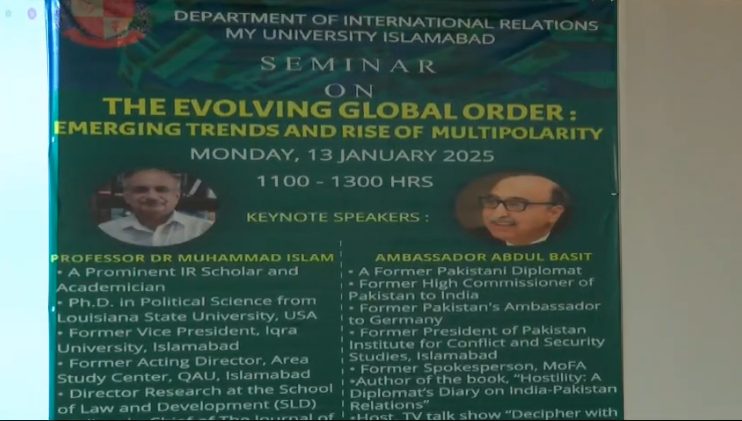On January 13, 2025, the Muslim Youth University Islamabad hosted a thought-provoking seminar titled “The Evolving Global Order: Emerging Trends and the Rise of Multipolarity.” The event, organized by the university’s Department of International Relations (IR), brought together influential voices in global diplomacy and academic scholarship to shed light on the shifting dynamics of world politics.
Former ambassador Abdul Basit and renowned scholar Professor Dr. Nauman Sattar were the keynote speakers at the seminar. Both experts delved into the emerging trends of global multipolarity and the reconfiguration of power in international relations.
Their insights were invaluable in highlighting how the global order is increasingly moving away from a unipolar world dominated by a single superpower to a more balanced and multifaceted international system, where multiple regional and global powers have a say in the decision-making processes.
Professor Dr. Nauman Sattar particularly emphasized the need for Pakistan to strategically leverage its geographical position to enhance its influence in global politics. He urged that Pakistan’s central location between key global players could serve as a significant advantage in asserting its diplomatic and economic interests. His advice was clear Pakistan must harness its geopolitical assets effectively to navigate the changing global landscape.
Muslim Youth University’s Vice Chancellor, Professor Dr. Saeed ul Hassan Chishti, also addressed the gathering, stressing the importance of advancing the Research Circle vision. He stated that the initiative’s primary goal is to increase the intellectual capital among Pakistan’s youth and to encourage a culture of critical thinking and academic inquiry.
His commitment to fostering a research-oriented approach among students is commendable, as it prepares them to tackle global challenges with a well-rounded perspective.
Professor Chishti added, “The objective of the Research Circle is to disseminate knowledge and foster intellectual growth among the youth of Pakistan, empowering them to participate actively in the global discourse.” This sentiment resonated deeply with the attendees, who recognized the value of such initiatives in enhancing the academic rigor and innovative thinking of the next generation.
The seminar, organized by the IR Department, was lauded by participants for its contribution to discussing Pakistan’s role in the evolving global politics. This discussion was particularly significant given the country’s strategic position in South Asia and its growing importance in international diplomacy.
It is clear that Pakistan’s role in global affairs is becoming increasingly important as the world transitions from a unipolar to a multipolar system.
Events like this are essential in nurturing the research capabilities of the youth, allowing them to understand complex international relations issues and equipping them with the knowledge needed to contribute meaningfully to the political and economic spheres.
This seminar served as a platform for students and scholars alike to engage in critical discussions about the future of global governance, the rise of new powers, and the challenges and opportunities Pakistan faces in this rapidly changing environment.
In conclusion, the seminar at Muslim Youth University Islamabad was a valuable addition to the ongoing discourse about the changing global order. It underscored the need for Pakistan to focus on its geopolitical strengths and actively engage in the evolving global conversation.
By promoting academic research and critical thought, the university is playing a key role in shaping the future leaders of Pakistan who can adeptly navigate the complexities of a multipolar world.


